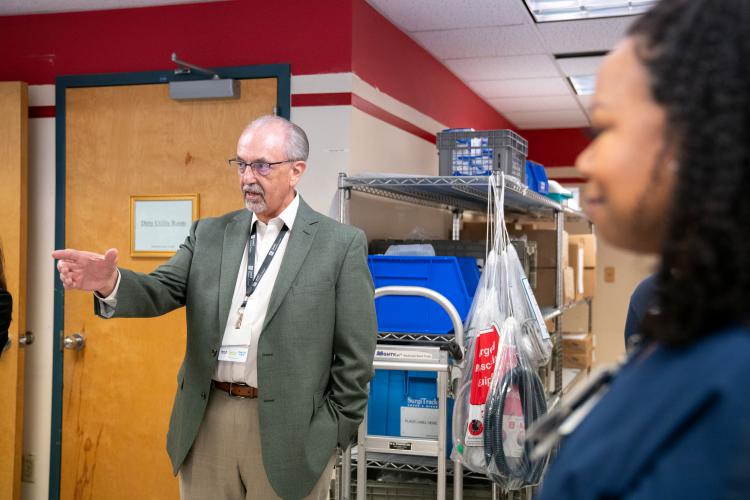
Jim Graves, Executive Director of the Departments of Respiratory Therapy and Neurodiagnostics at JPS Health Network, has been named Respiratory Care Manager of the Year by the Texas Society for Respiratory Care.
It was an honor that left the seven-year veteran of the health network both surprised and grateful.
“I found out about the award about a week before the conference because they called to ask me how I wanted my name engraved on it,” Graves said while holding the foot-tall, crystal pillar with a star on top. “It’s wonderful to be recognized by your peers in the healthcare industry. But what really means the most to me about this is that someone I work with thought enough of the way we do things here to nominate me. For that, I am truly touched.”
Graves said he doesn’t know exactly who submitted his name as one of the six finalists for the honor. But he said the things that were cited in the nomination were details only one of his JPS Respiratory Therapy colleagues would know about.
Rob Welborne, Clinical Manager of Respiratory Therapy, said he has no doubt that Graves truly deserves the award.
“He came here with tons of knowledge and has been a great resource for JPS since day one,” Welborne said. “He has a really collaborative attitude and communicates well with leaders from other departments to make sure that we’re all working together toward the same goals.”
One of the highlights of Graves’ work cited in the nomination was the progressive way JPS approaches respiratory therapy under his leadership.
“We don’t just stick with things because that’s the way that we’ve always done them,” Graves said. “We’re always looking for evidence-based solutions to respiratory issues to make sure we’re providing the best care to patients.”
One example of how JPS does things differently is that it basically flipped how orientation of new respiratory therapists is done. Instead of starting new team members on the floor and working them up to handle the toughest cases in the Intensive Care Unit, they start out working on the acute cases. Why? Because the goal is to keep cases from becoming acute in the first place. Welborne said Graves’ orientation priorities have helped to develop highly effective therapists who work closely with doctors and nurses to make sure patients get the best care possible.
By teaching respiratory therapists about the things that put people in the ICU, they can learn to be proactive and recognize warning signs in patients in lower levels of care, getting them treatment sooner in hopes of keeping them out of danger.
“What we need are therapists with solid assessment skills who recognize when someone on the floor needs more attention before they end up in the ICU,” Graves said. “That’s the most important thing.”
Founded in 1969, Texas Society for Respiratory Care was created to enhance the quality of patient care, to develop regional education programs and to advance the science, technology, art, and ethics of respiratory care while facilitating cooperation between healthcare providers and organizations.
